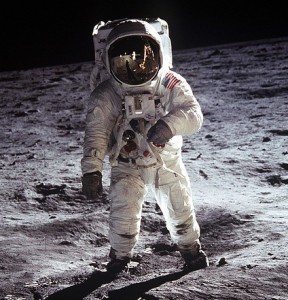This may sound silly, but I had never heard of the term “moonshot” before. Given all of the reading I have done for degrees in English, you would think I would know that one, but I didn’t. At first guess I would’ve said, “something having to do with the moon and space, and maybe an unlikely event,” and I would’ve been partly right. As it turns out, there are three definitions of the word according to Oxford Languages (via a Google search), and they involve launching a spacecraft to the moon, an  ambitious and innovative project, as well as a home run that is characterized by its height (really never heard that one).
ambitious and innovative project, as well as a home run that is characterized by its height (really never heard that one).
I mention this because I recently listened to an interview with Mike Massamino whose latest book is entitled, Moonshot: A NASA Astronaut’s Guide to Achieving the Impossible. After listening to the interview, I got the gist on what a moonshot is, but what was more interesting was some of the lessons he learned while in NASA and throughout life. Here are a few:
Keep trying even if you keep failing. Massamino had to apply to the space program four times, and he almost didn’t make it, but becoming an astronaut was his dream and he was determined to see it happen. The first two times, he was not accepted into the program; then, on the third try, he failed the eye exam, which meant he was basically out of the running. He didn’t need glasses (which weren’t allowed for astronauts and would have disqualified him anyway), but discovered that he had to undergo vision therapy to fix his vision issues, which was unknown at the time (and still fairly is). He didn’t give up though. He completed vision therapy over a year’s time and passed the eye exam so he applied again. Finally, on the fourth attempt, he was accepted into the space program. Most people would’ve given up after the first or second try, and the rest  would certainly have by the third with a failed eye exam and no way to fix it, but he didn’t. He says that even you are rejected multiple times and your dream seems like it will never happen, do not give up. To Massamino, not trying is the real failure.
would certainly have by the third with a failed eye exam and no way to fix it, but he didn’t. He says that even you are rejected multiple times and your dream seems like it will never happen, do not give up. To Massamino, not trying is the real failure.
Allow yourself 30-seconds of remorse and no more. Massimino learned a new method among his fellow astronauts for dealing with mistakes and to help him not dwell on the negative. If you mess up, make a mistake, or do something wrong, give yourself 30-seconds to berate yourself, call yourself names, and confirm all the fears and judgments about yourself; then, after those 30-seconds, let it go, and don’t revisit it again. Done and done. He says that we all make these mistakes (and in space they can be life-threatening), but we need to move on from them, and not constantly replay them in our heads. We grow from our mistakes by learning from them in an objective way, not by putting ourselves down and continually making ourselves feel worse.
Appreciate where we live. On Massimino’s second spacewalk, while on the moon and waiting for another astronaut to complete a task, he had the opportunity to stop and look around more. As he did, he saw our planet from a completely different perspective than from the window of the space shuttle. The delicate blue ring of our atmosphere and its fragility, the beauty of it and the Earth itself made him realize that, in his opinion, this place, our planet, is our own private heav en. Looking in one direction, he saw complete darkness, and in the other, the ball of fire that is the sun. From that experience, he said that he’s “checked out the neighborhood, and there is nothing around, it is only our planet.”
en. Looking in one direction, he saw complete darkness, and in the other, the ball of fire that is the sun. From that experience, he said that he’s “checked out the neighborhood, and there is nothing around, it is only our planet.”
Seeing it firsthand and knowing what we have here on Earth makes him appreciate it each day, from the awesome aspects of nature to the incredible inventions of man. He thinks that the appreciation of living on this planet can help sustain us each day. “The planet itself is a precious place. It is a paradise for us to live on. There are opportunities for happiness, and love, and friendship, and for us to just enjoy it.” He would know; he went beyond Earth! Not many of us can have such a perspective.
He ends the interview by encouraging the audience to continue to pursue their moonshot, whatever it may be. He is living proof that it’s possible, and he wants us all to have the courage to do the same. (Knowing the definition of that word now, I’ll keep trying!)